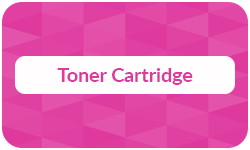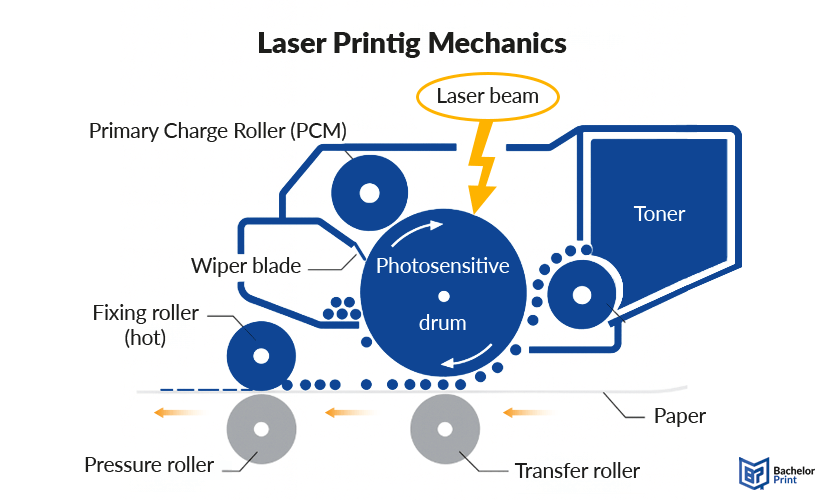
The world of printmaking today differentiates between two types of printers: inkjet printers and laser printers. Although there are various other types, these two are the most common ones used. While inkjet printers use printing ink cartridges for printing, laser printers require different equipment. How toner cartridges work and what they can and cannot be used for will be thoroughly explained in the following article.
Definition: Toner cartridge
In a toner cartridge, the pigments are not carried by a fluid that soaks into the page, but instead, a powder is used, which is cured onto the medium with heat. The toner consists of plastic particles, carbon, synthetic resin, silica, and the pigment, which is transferred onto the printer paper through an electrostatically charged drum. This drum is either implemented into the toner cartridge or has to be inserted into the printer separately.
Print black & white copies online for AU$0.16
- Print black & white copies in bulk or in small quantities
- Affordable single- & double-sided black and white copies
- Professional printing service for individual printouts
Learn more!
Applications and limitations
The applications of laser toner cartridges are wide, whether it is simple document printing, flyers, cards, business cards, posters, banners, etc. Laser toner excels especially in high-volume printing and professional documents.
While you can use laser printers as well for images, prints with many pictures or graphs are recommended to be printed via inkjet, as these printers have higher precision in image printing.
Advantages and disadvantages
Laser toner cartridges have many advantages and disadvantages to consider before deciding on using them.
Advantages
- Excellent quality without smudging
- Cost-effective for large-volume printing
- Faster printing and no drying time needed
- No dry out; longer storage capability
Disadvantages
- Cartridges to change are more expensive
- Low toner filling can cause smudges
- Higher initial costs, unsuited for low-volume printing
- Not sustainable due to the cartridges and powder ingredients
Mechanics
The principle behind laser printing is a bit more complicated than normal inkjet printing, as it is based on electrostatic charges. The drum, a light-responsive cylinder, is charged negatively by a primary charge roller (PCR). The laser then creates a positively charged image or text on the drum, which then attracts the electrically charged toner powder. After the powder is distributed on the drum, it is melted and fixed on the page. After the printing process, a wiper blade removes all excess laser toner from the drum, pushing it into a waste bin in order to be ready for the next, clear print.

Types
Generally, there is a difference between OEM, compatible, and remanufactured toner cartridges, which are important to separate as they need to be considered when buying toner refills.
OEM is short for Original Equipment Manufacturer, meaning that the toner cartridge is produced by the same manufacturer of the printer for this exact model. This ensures the highest compatibility and print quality. Manufacturers always recommend using OEMs, as third-party cartridges can potentially harm the printer and its equipment. However, while they are more widely available, they are also often pricier.
Compatible toner cartridges, also often called alternative brand cartridges, are those manufactured by independent companies made to fit generic printer models. There are, however, certain problems that can potentially come up when using compatible cartridges. For example, the melting point of the toner can differ from the OEM product, or the particle size, as well as the electrostatic capabilities of the pigments, can differ from the original, leading to poor print quality.
Remanufactured or refilled toner cartridges are either OEM or compatible ones, which are filled with new toner powder after they are empty. While remanufactured OEMs do ensure mechanical compatibility, poor handling might lead to leaking. Furthermore, the quality of the toner powder might not be close to the original product, leading to poor print quality. On the other hand, remanufactured cartridges are more sustainable, as less plastic is used to produce new cartridges.
Online A4 printing for AU$0.16
- Configure the printing specifications for your A4-size prints
- Professional A4 prints for personal and business use
- Quick production times & reputable delivery
Learn more!
FAQs
A toner cartridge is the vessel containing the laser toner powder used by laserjet printers. The toner usually consists of a pigment, as well as plastic particles, synthetic resin, silica, and carbon.
While every manufacturer has their own formula for toner fitting the corresponding printer device, there are generally three types of toner cartridges:
- OEMs (Original Equipment Manufacturers), which are produced by the same company as the printer and are meant for specific models.
- Compatible cartridges from external manufacturers, meant to fit specific devices, for a cheaper price.
- Remanufactured ones, which are repaired and then refilled for repeated use.
No, toner cartridges are used for laser printers, while ink cartridges are meant for inkjet printers. Furthermore, ink is usually a liquid, while toner comes in the form of powder that melts under heat and pressure in the appropriate printer. This is why you cannot use laser toner in inkjet printers or vice versa.